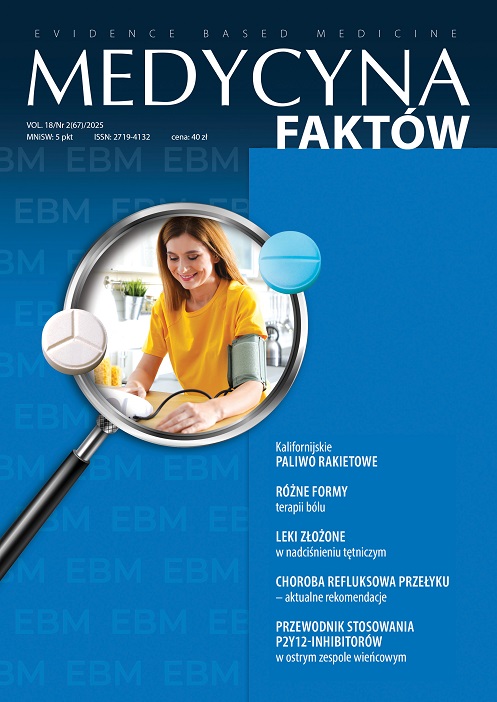Profile pacjentów, którzy mogą odnieść korzyści z terapii pregabaliną Opis przypadku
##plugins.themes.bootstrap3.article.main##
Abstrakt
Pregabalina to lek działający na kanały wapniowe w układzie nerwowym, który wykazuje działanie przeciwlękowe, przeciwbólowe i przeciwdrgawkowe. W odróżnieniu od benzodiazepin nie powoduje uzależnienia ani sedacji, a jego efekt terapeutyczny pojawia się szybko – często w ciągu kilku dni. Zarejestrowano ją do leczenia padaczki, bólu neuropatycznego i uogólnionego zaburzenia lękowego (GAD). Pregabalina jest szczególnie skuteczna u pacjentów z objawami somatycznymi lęku, bezsennością, przewlekłym bólem lub po detoksykacji alkoholowej. Wykazuje dobrą tolerancję u osób starszych i nie wchodzi w istotne interakcje lekowe. Jej dawkowanie należy dostosować do funkcji nerek. Pregabalina stanowi wartościową alternatywę lub uzupełnienie terapii u pacjentów, u których SSRI/SNRI są nieskuteczne lub źle tolerowane.
##plugins.themes.bootstrap3.article.details##
Copyright ? by Medical Education. All rights reserved.
Bibliografia
2. Baldwin DS, Ajel K, Masdrakis VG. Pregabalin for the treatment of generalized anxiety disorder: a novel pharmacologic option for treatment-resistant anxiety. CNS Spectr. 2007; 12(3): 192-8.
3. Frampton JE. Pregabalin: A review of its use in adults with generalized anxiety disorder. CNS Drugs. 2014; 28(9): 835-54.
4. Feltner DE, Crockatt JG, Dubovsky SJ et al. A randomized, double-blind, placebo-controlled, fixed-dose, multicenter study of pregabalin in patients with generalized anxiety disorder. J Clin Psychopharmacol. 2003; 23(3): 240-9.
5. Montgomery SA, Tobias K, Zornberg GL et al. Efficacy and safety of pregabalin in the treatment of generalized anxiety disorder: a 6-week, multicenter, randomized, double-blind, placebo-controlled comparison of pregabalin and venlafaxine. J Clin Psychiatry. 2006; 67(5): 771-82.
6. European Medicines Agency. Lyrica – Summary of Product Characteristics.
7. Bandelow B, Reitt M, Röver C et al. Efficacy of treatments for anxiety disorders: a meta-analysis. Int Clin Psychopharmacol. 2015; 30(4): 183-92.
8. Bockbrader HN, Radulovic LL, Posvar EL et al. Clinical pharmacokinetics of pregabalin in healthy subjects. J Clin Pharmacol. 2010; 50(8): 941-50.
9. Lydiard B, Rickels K, Herman B, Feltner DE. Comparative efficacy of pregabalin and benzodiazepines in treating the psychic and somatic symptoms of generalized anxiety disorder. Int J Neuropsychopharmacology 2010; 13(2): 229-241. https://doi.org/10.1017/S1461145709990460.
10. Montgomery S, Chatamra K, Pauer L, Whalen E, Baldinetti F. Efficacy and safety of pregabalin in elderly people with generalised anxiety disorder. Br J Psychiatry. 2008; 193(5): 389-394. http://doi.org/10.1192/bjp.bp.107.037788.
11. Förg A, Hein J, Volkmar K, Winter M, Richter C, Heinz A, Müller CA. Efficacy and Safety of Pregabalin in the Treatment of Alcohol Withdrawal Syndrome: A Randomized Placebo-Controlled Trial, Alcohol and Alcoholism 2012; 47(2): 149-155. https://doi.org/10.1093/alcalc/agr153.
12. Guglielmo R, Martinotti G, Clerici M, Janiri L. Pregabalin for alcohol dependence: a critical review of the literature. Adv Ther. 2012; 29(11): 947-57. http://doi.org/10.1007/s12325-012-0061-5.
13. Martinotti G, di Nicola M, Frustaci A et al. Pregabalin, tiapride and lorazepam in alcohol withdrawal syndrome: a multi-centre, randomized, single-blind comparison trial. Addiction. 2010; 105(2): 288-99. http://doi.org/10.1111/j.1360-0443.2009.02792.x.
